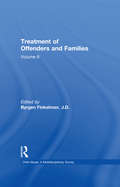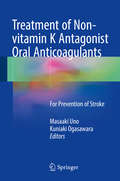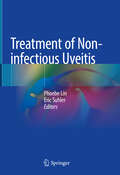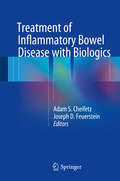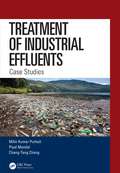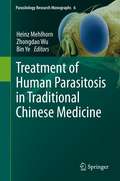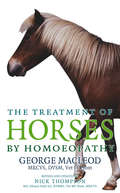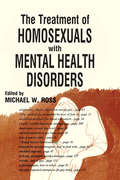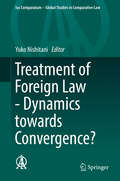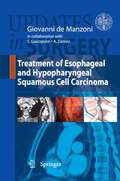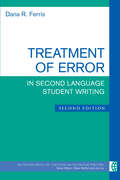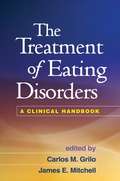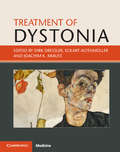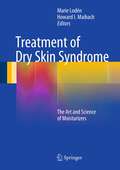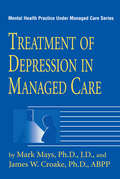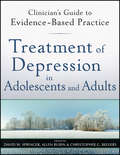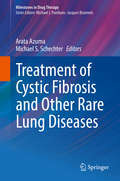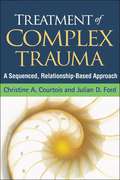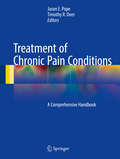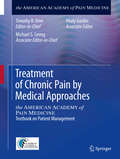- Table View
- List View
Treatment of Ongoing Hemorrhage
by Chad G. Ball Elijah DixonThis volume provides a concise yet comprehensive review of techniques for stopping ongoing hemorrhage in all areas of the body. The text discusses open surgical techniques and minimally invasive (percutaneous, endoscopic, radiologic, laparoscopic) approaches, as well as techniques appropriate to pre-hospital settings, such as "on the scene", ambulance, and the battlefield. The techniques and tips are delivered in a detailed, yet simple and straight-forward manner so that readers are more readily able to replicate these concepts in the face of ongoing, life-threatening hemorrhage. Written by experts in the field, Treatment of Ongoing Hemorrhage: A Practical Guide is a valuable resource for surgeons, trainees, and any physician who works within the emergency department or upon critically ill patients.
Treatment of Offenders and Families (Child Abuse: A Multidisciplinary Survey #Vol. 6)
by J. D. Byrgen FinkelmanFirst Published in 1995. Routledge is an imprint of Taylor & Francis, an informa company.
The Treatment of Nonperforming Loans in Macroeconomic Statistics
by Adriaan M. Bloem Cornells N. GorterA report from the International Monetary Fund.
Treatment of Non-vitamin K Antagonist Oral Anticoagulants
by Masaaki Uno Kuniaki OgasawaraThis book describes new concepts and strategies for the clinical application of non-vitamin K antagonist oral anticoagulants (NOACs) for stroke. Although vitamin K antagonists have traditionally been used for the prevention of stroke, there are some problems associated with their use, such as the risk of intracranial hemorrhage, the need for dietary restrictions, and individual variability. Recently, NOACs have been introduced as alternatives to traditional anticoagulants and are becoming an option for treating stroke patients around the globe. However, their use is not without risk. Each chapter describes the successful use of NOACs for stroke patients and discusses their future impact from various points of view. The book is primarily written for neurosurgeons and neurologists but is also of interest to cardiologists involved in stroke treatment.
Treatment of Non-infectious Uveitis
by Phoebe Lin Eric SuhlerThis unique, comprehensive book provides a much-needed reference on the treatment and management of non-infectious uveitis. Carefully designed, Treatment of Non-infectious Uveitis is the first book of its kind to provide an in-depth, clinically-relevant, expert-driven resource for ophthalmologists focusing on modalities of uveitis treatment, their mechanism of action, dosing, and side effects.Each chapter provides an introduction, mechanism of action, indication, dosage, side effects, and efficacy summaries from clinical trials and other published literature. Topics range from topical treatment, to locally administered therapy including drug-releasing implants, to systemic immunosuppressive treatments both tried and new, as well as surgical management, with each chapter highlighting important practice pearls as well as easy-reference dosing tables, side effects, and lab monitoring pertinent to the agents discussed. The book concludes with a discussion of novel approaches to the treatment of non-infectious uveitis, and special considerations when treating uveitis in the pediatric patient. The majority of patients with non-infectious uveitis are treated by comprehensive ophthalmologists, many of whom are less familiar with established treatment guidelines outlining the role of corticosteroids and immunomodulatory therapy. While the non-specialist, resident, or fellow is sure to benefit from this one-stop guide to uveitis treatment, retina and uveitis specialists alike will also appreciate the practice tips and thorough coverage of this expertly-written reference. Treatment of Non-infectious Uveitis is the ideal reference for all ophthalmologists who seek to improve their understanding of the causes of uveitis and learn how to best treat this condition.
Treatment of Mobile Phone Licenses in the National Accounts
by Robert J. Dippelsman Nils Ø. MæhleA report from the International Monetary Fund.
Treatment of Inflammatory Bowel Disease with Biologics
by Adam S. Cheifetz Joseph D. FeuersteinThis book is a concise yet comprehensive overview of the use of biologics for the treatment of Crohn's disease and ulcerative colitis. The volume details how best to utilize these medications in order to optimize their efficacy and safety, as well as how to understand, recognize, and treat complications that may arise from using biologics to treat IBD. The text also focuses on new data, novel biologics, and biosimilars of this rapidly expanding field. Written by experts in the field, Treatment of Inflammatory Bowel Disease with Biologics is a valuable resource for gastroenterologists, allied health professionals, fellows, and trainees who treat patients with inflammatory bowel disease.
Treatment of Industrial Effluents: Case Studies
by Mihir Kumar Purkait Piyal Mondal Chang-Tang ChangTo address the issue of discharge of untreated industrial effluent in the water body causing pollution, adoption of cleaner production technologies and waste minimization initiatives are being encouraged. The book explains each related technology elaborately and critically analyses the same from practical application point of view. In-depth characterization, environmental and health effects and treatment of various industrial effluents are discussed with case studies. Limitations, challenges and remedial actions to be taken are included at the end of each chapter. Chapters are arranged as per specific type of effluents from various industries like textile, tannery/leather plant, and oil refinery.
Treatment of Human Parasitosis in Traditional Chinese Medicine
by Heinz Mehlhorn Zhongdao Wu Bin YeThis book intensively examines the efficacy of plant-derived products that have been used for over a thousand years by practitioners of so-called Traditional Chinese Medicine in the light of recent chemotherapeuticals. The chapters were written by renowned Chinese medical researchers and are supplemented by results obtained in German antiparasitic research projects. Parasites and emerging diseases are a major threat of our time, which is characterized by an enormous increase in the size of the human population and by an unbelievably rapid globalization that has led to the daily transport of millions of humans and containers with goods from one end of the earth to the other. Furthermore the slow but constant global warming offers new opportunities for many agents of diseases to become established in new areas. Therefore it is essential that we develop precautions in order to avoid epidemics or even pandemics in overcrowded megacities or at the large-scale farm animal confinements that are needed to secure a steady flow of food in the crowded regions of the world. Of course intensive research in the field of chemotherapy since 1900 has produced unbelievable breakthroughs in therapies for formerly untreatable and thus deadly diseases. However, a large number of untreatable diseases remain, as well as a constantly growing number of agents of disease that have developed resistances to standard chemical compounds. As such, it is not only worthwhile but also vital to consider the enormous amounts of information that have been obtained by human "high cultures" in the past. Examples from the past (like quinine) or present (like artemisinin, a modern antimalarial drug) show that plant extracts may hold tremendous potential in the fight against parasites and/or against vector-transmitted agents of diseases.
The Treatment Of Horses By Homoeopathy
by George MacleodThis book is for anyone who is interested in the welfare of horses, and who wishes to know more about treating them with homoeopathic remedies. Increasing numbers of horse owners and handlers today confirm that homoeopathy is a speedy and effective treatment, which can often deal with so-called 'incurable' ailments. As this fascinating guide explains, homoeopathic remedies are absolutely safe, easy to administer and have no side effects. This authoritative book includes advice on treating horses homoeopathically for both specific diseases and common ailments.
The Treatment of Homosexuals With Mental Health Disorders
by Michael W RossA major text for clinicians and researchers who have an interest in homosexuality and homosexual patients with mental disorders, this book is an up-to-date review as well as a handbook covering the full range of affirmative treatments and therapies for lesbian and gay clients. Expert contributors look at problems caused by stigma and homophobic societal attitudes and discuss methods that can be used to work with gay clients in a positive context. Other issues of particular importance in working with lesbians and gay men are addressed.
Treatment of Foreign Law - Dynamics towards Convergence?
by Yuko NishitaniThis work presents a thorough investigation of existing rules and features of the treatment of foreign law in various jurisdictions. Private international law (conflict of laws) and civil procedure rules concerning the application and ascertainment of foreign law differ significantly from jurisdiction to jurisdiction. Combining general and individual national reports, this volume demonstrates when and how foreign law is applied, ascertained, interpreted and reviewed by appeal courts. Traditionally, conflicts lawyers have been faced with two contrasting approaches. Civil law jurisdictions characterize foreign law as "law" and provide for the ex officio application and ascertainment of foreign law by judges. Common law jurisdictions consider foreign law as "fact" and require that parties plead and prove foreign law. A closer look at various reports, however, reveals more differentiated features with their own nuances among civil law jurisdictions, and the difference of the treatment of foreign law from other facts in common law jurisdictions. This challenges the appropriacy of the conventional "law-fact" dichotomy. This book further examines the need for facilitating access to foreign law. After carefully analyzing the benefits and drawbacks of existing instruments, this book explores alternative methods for enhancing access to foreign law and considers practical ways of obtaining information on foreign law. It remains to be seen whether and the extent to which legal systems around the world will integrate and converge in their treatment of foreign law.
Treatment of Esophageal and Hypopharingeal Squamous Cell Carcinoma
by Giovanni De ManzoniSquamous cell carcinoma of the esophagus has a lower incidence than other gastrointestinal tract cancer; however, there are many difficult issued related to the choice of appropriate therapy for these patients. In recent years, the use of multimodal treatment has greatly improved the prognosis of patients affected by this disease but several aspects of the oncological and surgical management are still controversial. This book aims to give a homogeneous approach to esophageal cancer treatment, based on the author's lifetime experience in conjunction with exhaustive review of recent literature. In each chapter surgeons and oncologists will find appropriate tools for correct management of the diagnosis and therapy of this difficult disease. The book analyzes all the aspects of staging and treatment, such as modern diagnostic and staging techniques (MRI or PET-CT), endoscopic treatment of early cancer, new minimally invasive and open surgical techniques, and combined treatment. In addition, there are chapters dedicated to the postoperative course of these patients, as well as their quality of life, with indications for the correct follow-up and treatment of relapses.
Treatment of Error in Second Language Student Writing, Second Edition
by Ferris Dana R.Treatment of Error offers a realistic, well-reasoned account of what teachers of multilingual writers need to know about error and how to put what they know to use. As in the first edition, Ferris again persuasively addresses the fundamental error treatment questions that plague novice and expert writing specialists alike: What types of errors should teachers respond to? When should we respond to them? What are the most efficacious ways of responding to them? And ultimately, what role should error treatment play in the teaching of the process of writing? The second edition improves upon the first by exploring changes in the field since 2002, such as the growing diversity in what is called L2 writers, the blurring boundaries between native and non-native speakers of English, the influence of genre studies and corpus linguistics on the teaching of writing, and the need the move beyond error to second language development in terms of approaching students and their texts. It also explores what teacher preparation programs need to do to train teachers to treat student error. The second edition features * an updating of the literature in all chapters * a new chapter on academic language development * a postscript on how to integrate error treatment/language development suggestions in Chapters 4-6 into a writing class syllabus * the addition of discussion/analysis questions at the end of each chapter, plus suggested readings, to make the book more useful in pedagogy or teacher development workshops"
Treatment of Eating Disorders
by Carlos Grilo James MitchellEminently practical and authoritative, this comprehensive clinical handbook brings together leading international experts on eating disorders to describe the most effective treatments and how to implement them. Coverage encompasses psychosocial, family-based, medical, and nutritional therapies for anorexia nervosa, bulimia nervosa, binge-eating disorder, and other eating disorders and disturbances. Especially noteworthy are "mini-manuals" that present the nuts and bolts of 11 of the treatment approaches, complete with reproducible handouts and forms. The volume also provides an overview of assessment, treatment planning, and medical management issues. Special topics include psychiatric comorbidities, involuntary treatment, support for caregivers, childhood eating disorders, and new directions in treatment research and evaluation.
Treatment of Dystonia
by Dirk Dressler Eckart Altenmüller Joachim K. KraussOur understanding of dystonia is advancing rapidly. This comprehensive reference work provides an effective guide to this challenging group of disorders, offering an overview of the current and emerging treatment options for all manifestations. Treatments for the many forms of dystonia differ substantially in pediatrics and adults - both are covered in detail in this book. Approaches include botulinum toxin therapy, deep brain stimulation, oral drug applications, rehabilitation, and behavioral and experimental therapies. Special emphasis is also given to combining different treatment modalities in order to achieve optimal effect. Treatment of Dystonia brings together peer-reviewed articles, written by experts and based on work presented at international conferences. By enabling the physician to select and combine the best therapies, it is an essential resource for neurologists, neurosurgeons and physical therapists.
Treatment of Dry Skin Syndrome
by Howard I. Maibach Marie LodénDevelopment of moisturizers is a scientific and artistic discipline, where consumer insights are also needed. This new book bridges the gap between the moisturizers and the skin by covering all the essential information required to tailor the use of moisturizers to particular disorders and patients. Important aspects of skin biochemistry and barrier function are explained, and the ingredients and treatment effects of moisturizers are explored in depth. Careful attention is paid to controversies, including the role of certain moisturizers in inducing dryness/eczema, asthma, and comedones. The information provided in this unique book will enable the reader to go beyond the traditional thinking regarding skin care. The novel insights offered will suggest the properties required for a new generation of moisturizing treatments that more effectively improve the quality of life.
The Treatment of Drinking Problems: A Guide to the Helping Professions
by Christopher Cook E. Jane Marshall Keith Humphreys David M. Ball Griffith EdwardsMarshall (psychiatry and addictions, King's College London, UK), along with new co-authors, discuss the treatment of alcoholism by generalists and specialists like mental health and other medical practitioners. They first describe the definitions, drug effects, causes, social and physical complications, relationship to psychiatric disorders, other drug problems, and presentation of alcoholism, then address treatment in non-specialist and specialist settings, as well as assessment, withdrawal states, Alcoholics Anonymous and other organizations, spiritual and religious issues, working towards normal drinking, and common difficulties in treatment. This edition has been revised and updated to include new sections on interventions for hazardous and harmful drinking, dependent drinking, and the different settings in which alcohol problems are encountered. Information on women's issues has been integrated throughout. Annotation ©2011 Book News, Inc. , Portland, OR (booknews. com)
Treatment Of Depression In Managed Care (Mental Health Practice Under Managed Care Ser. #No.7)
by Mark Mays James W. CroakePublished in 1997, Treatment of Depression in Managed Care is a valuable contribution to the field of Psychiatry/Clinical Psychology.
Treatment of Depression in Adolescents and Adults
by David W. Springer Allen Rubin Christopher G. BeeversEvidence-based interventions for treating depression in adolescents and adults Part of the Clinician's Guide to Evidence-Based Practice Series, Treatment of Depression in Adolescents and Adults provides busy mental health practitioners with detailed, step-by-step guidance for implementing clinical interventions that are supported by the latest scientific evidence. This thorough, yet practical volume draws on a roster of experts and researchers in the field who have assembled state-of-the-art knowledge into this well-rounded guide. Each chapter serves as a practitioner-focused how-to reference and covers interventions that have the best empirical support for the treatment of depression, including: Cognitive Behavior Therapy Behavioral Activation Cognitive Behavioral Analysis System of Psychotherapy for Chronic Depression Easy to use and accessible in tone, Treatment of Depression in Adolescents and Adults is indispensable for practitioners who would like to implement evidence-based, culturally competent, effective interventions in their care of clients struggling with depression.
Treatment of Cystic Fibrosis and Other Rare Lung Diseases
by Arata Azuma Michael S. SchechterThis volume describes the pathogenesis and pathophysiology of several pulmonary diseases as well as their treatment. It also discusses the underlying genetic and molecular biological basis, which opens the way for new treatments for these conditions. It focuses on the treatment of cystic fibrosis including CFTR (cystic fibrosis transmembrane-conductance regulator) modulator therapies, drug therapies that augment airway surface liquid as well as anti-inflammatory and anti-infective therapies. Further topics include long-term, low-dose macrolide therapy for diffuse panbronchiolitis; novel agents for previously untreatable idiopathic pulmonary fibrosis; possible new treatments for pulmonary alveolar proteinosis (PAP); and multiple novel therapeutic targets for treating lymphangiomyomatosis. Research into these conditions has led to major advances in our understanding of the underlying genetic and molecular basis of this disease, and to dramatic improvements in survival and quality of life for affected individuals.
Treatment of Complex Trauma
by Julian D. Ford John Briere Christine A. CourtoisThis insightful guide provides a pragmatic roadmap for treating adult survivors of complex psychological trauma. Christine Courtois and Julian Ford present their effective, research-based approach for helping clients move through three clearly defined phases of posttraumatic recovery. Two detailed case examples run throughout the book, illustrating how to plan and implement strengths-based interventions that use a secure therapeutic alliance as a catalyst for change. Essential topics include managing crises, treating severe affect dysregulation and dissociation, and therapist self-care. The companion website offers downloadable reflection questions for clinicians and extensive listings of professional and self-help resources. A new preface in the paperback and e-book editions addresses key scientific advances. See also Drs. Courtois and Ford's edited volumes, Treating Complex Traumatic Stress Disorders (Adults) and Treating Complex Traumatic Stress Disorders in Children and Adolescents, which present research on the nature of complex trauma and review evidence-based treatment models. Winner (Second Place)--American Journal of Nursing Book of the Year Award, Psychiatric and Mental Health Nursing Category
Treatment of Complex Trauma
by Julian D. Ford Christine A. CourtoisThis insightful guide provides a pragmatic roadmap for treating adult survivors of complex psychological trauma. Christine Courtois and Julian Ford present their effective, research-based approach for helping clients move through three clearly defined phases of posttraumatic recovery. Two detailed case examples run throughout the book, illustrating how to plan and implement strengths-based interventions that use a secure therapeutic alliance as a catalyst for change. Essential topics include managing crises, treating severe affect dysregulation and dissociation, and dealing with the emotional impact of this type of work. The companion Web page offers downloadable reflection questions for clinicians and extensive listings of professional and self-help resources. See also Drs. Courtois and Ford's edited volume, Treating Complex Traumatic Stress Disorders, which presents research on the nature of complex trauma and reviews a range of evidence-based treatment models for adults.
Treatment of Chronic Pain Conditions
by Jason E. Pope Timothy R DeerThere is an unmet need in both acute and chronic care settings for a comprehensive, clinically focused, fast reference on pain management. Written by high-profile, internationally recognized experts in field, Pain Treatment for Acute and Chronic Conditions: A Comprehensive Handbook is one of the first manuals of its kind to provide balanced and comprehensive coverage of pain medicine modalities. The book is structured into sixteen sections with each chapter providing key points for quick reference, followed by a more detailed overview of the topic at hand with extensive tables and figures to illustrate. Beautifully laid out and extensively furnished with both research and experience, this book is a necessary resource in the field of pain medicine.
Treatment of Chronic Pain by Medical Approaches
by Timothy R. Deer Michael S. Leong Vitaly GordinFrom reviews of Deer, eds. , Comprehensive Treatment of Chronic Pain by Medical, Interventional, and Integrative Approaches: "Comprehensive Treatment of Chronic Pain by Medical, Interventional, and Integrative Approaches is a major textbook. . . [I]t should be a part of all departmental libraries and in the reference collection of pain fellows and pain practitioners. In fact, this text could be to pain as Miller is to general anesthesia. " Journal of Neurosurgical Anesthesiology Edited by master clinician-experts appointed by the American Academy of Pain Medicine, this is a soft cover version of the Medical section of the acclaimed Deer, eds. , Comprehensive Treatment of Chronic Pain by Medical, Interventional, and Integrative Approaches. It is intended as a primary reference for busy clinicians who seek up-to-date and authoritative information about medical approaches to treating chronic pain. Clinically focused resource on the medical management of chronic pain Leading edge topics, such as monitoring opioid use and abuse, the emerging role of cannabinoids in pain treatment, and the systems involved in nociceptive processing systems "Key Points" preview contents of each chapter

